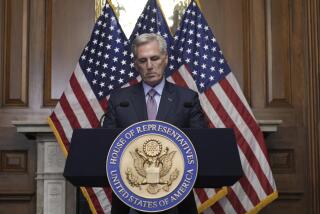FPPC Chief Tells Concern Over His Political Leave
SACRAMENTO — Admitting concern that his actions might be viewed as a conflict of interest, Fair Political Practices Commission Chairman Dan Stanford said Monday he will take a monthlong leave from his post as the state’s chief political watchdog to test his own political future.
Speaking at a press conference, Stanford, a Republican appointed by Gov. George Deukmejian, said he intends to consult with party leaders and his family about a possible run for secretary of state, state controller or other statewide offices now held by Democrats.
Stanford, 35, said he will leave at the conclusion of today’s commission meeting, where he is scheduled to propose a sweeping reform of legislative campaign finance laws.
Reports that Stanford is considering a run for elective office had raised concern about his credibility as head of a commission that regulates political campaigns.
Questions about Stanford’s political ambitions were raised initially by California Common Cause, a political reform group, when its director, Walter Zelman, sent a letter to Stanford suggesting that he either resign the commission or “state unequivocally” that he is not a candidate. The idea of a temporary leave surfaced only after there was no response to the letter, Zelman said.
“The concern,” he added, “is that he’d be out there seeking campaign contributions and support from people he has to regulate. Will his view of the (political reform) act and willingness to enforce it be affected by the need for support from those people he is policing?”
With his wife at his side, Stanford, a persistent critic of the influence of campaign money on the political process, said Monday that he decided to take a leave of absence after consulting with Deukmejian, officials in the attorney general’s office and Common Cause. He said he had “received the blessing of the governor.”
However, he acknowledged that the decision could place him in a “difficult position” because he intends to resume his political watchdog role if he decides not to run for elective office.
Stanford added that should he decide to run, he will not limit the amount of money that can be contributed to his campaign even though the campaign reform he will propose to the commission includes such limitations.
“I don’t think that taking a firm stand and standing up for what you believe in should be a detriment to holding public office, he said.”
While Stanford generally has won praise from Democrats and Republicans, his often outspoken criticism of the Legislature’s political activities has stirred controversy.
Last week, Republican Assemblyman Larry Stirling of San Diego accused Stanford of “feathering his own potential political nest” by accusing lawmakers of putting access to their offices “on the auction block to the highest bidder.”
Stanford, a lawyer who co-chaired Deukmejian’s election campaign in San Diego, was appointed to the FPPC post in 1983.
More to Read
Get the L.A. Times Politics newsletter
Deeply reported insights into legislation, politics and policy from Sacramento, Washington and beyond. In your inbox three times per week.
You may occasionally receive promotional content from the Los Angeles Times.










